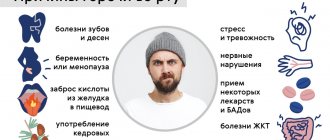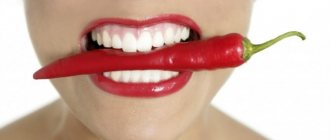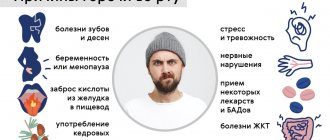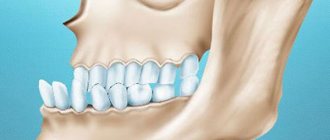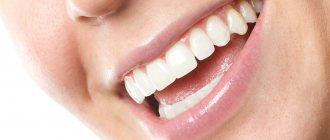Many people feel the taste of bitterness in the mouth, especially in older age, when various chronic diseases are acquired. The main causes of bitterness in the mouth after eating include diseases of the gastrointestinal tract, oral cavity, liver and gall bladder.
In rare cases, a bitter taste is a side effect of various medications or eating any foods, for example, fatty, fried, processed foods. These sensations are temporary and disappear after their cause is eliminated. The constant bitter taste sensation must be taken seriously.
Causes
Bitterness in the mouth after eating is a rather unpleasant symptom.
Depending on the circumstances and with what frequency bitterness in the mouth occurs, the etiology of this symptom can be assumed:
- Every morning you feel bitterness - this is a symptom of liver failure or gallbladder disease.
- After physical activity - liver disease.
- After eating - diseases of the stomach, intestines and gall bladder.
- When eating fatty or fried foods, diseases of the gallbladder, liver and bile ducts occur.
- Constant causeless bitterness is a symptom of cholecystitis, cholelithiasis, endocrine or psychological disorders, as well as cancer of the stomach, esophagus or intestines.
- Rare and quickly passing sensations of bitterness are the consequences of taking medications or stress.
It's all about the bile
How does bitterness in the mouth occur after eating? Thanks to the functioning of the liver, fats are broken down into food components that are easily digested. In this case, bile is released into the duct and emulsifies fats into particles. In cases of pathological processes, bile stagnates in the canal and is released into the esophagus. Bile also accumulates in the gallbladder. Due to this, a bitter taste appears in the mouth.
The cause of bile stagnation can be various diseases of the gastrointestinal tract, including inflammatory and infectious ones. In this case, bile enters the gastrointestinal canal in an amount that is not enough for the complete processing of all food.
Also, in this case, intestinal motility disorders occur, and as a result, stagnation of the digestive process. Undigested food is retained in the intestines, and rotting processes begin - this causes changes in taste sensations and the appearance of a bitter taste. A bitter taste in the mouth after eating food can be a symptom of the following diseases:
- Cholecystitis
- Jaundice
- Pancreatitis
- Colitis
- Gastroesophageal reflux disease
- Dyskenesia
Cholecystitis
Cholecystitis is an inflammation of the gallbladder. This disease is accompanied by bitterness in the mouth, heartburn, pain in the right side, and dry mouth. During the acute form of the disease, the temperature rises and vomiting, stool disturbances and the formation of a white coating on the tongue are possible.
Gastroesophageal reflux disease
Bitterness in the mouth after eating as an alarm signal
During this disease, there is an active release of gastric juice into the esophagus, sometimes so intensely that it reaches the esophagus and mouth. Therefore, it is not surprising to feel bitterness after eating. Such emissions usually occur due to overeating, abuse of fatty and fried or spicy foods.
Food poisoning and bitter saliva
Foodborne toxic infection is very often accompanied by a taste of bile due to general toxicosis of the body and malfunctions of the digestive system. This includes vomiting bile and bile reflux. Often, after poisoning, a person temporarily lacks appetite. Food does not enter the stomach, and bile, despite this, is produced by the liver around the clock. It stagnates and some of it is thrown into the stomach and esophagus.
It takes time to normalize the functioning of the digestive tract after the symptoms of poisoning disappear. Then the unpleasant taste sensations will pass.
Other reasons
A bitter taste in the mouth can also be felt for reasons not related to diseases of the gastrointestinal tract. These reasons include:
- Hormonal disorders
- Gingivitis
- Periodontitis
- Diabetes
- Taste disorders
- Oral diseases
Inflammatory diseases of the oral cavity, untreated caries and pulpitis, periodontitis and gingivitis can often be accompanied by bitterness after eating. This is due to the processes of decay in the mouth, inside the tooth or gum. During inflammation, many pathogenic microorganisms appear in the oral cavity; as a result of their reproduction and the spread of their waste products, bad breath and bitterness appear.
Taste disorders
With this disease, disruptions in the functioning of taste buds located in the palate and tongue occur. Many people suffering from this disease feel bitterness all the time. Elderly people, whose number of taste buds are significantly reduced, are susceptible to this disease.
Hormonal disorders
Diseases of the endocrine system are accompanied by hormonal disorders. If they are associated with a malfunction of the thyroid gland, an increased amount of secretion is released. As a result, adrenaline is released. This hormone can provoke muscle spasms of the biliary tract, after which dyskinesia occurs and, as a result, bitterness in the mouth.
Pregnancy
During pregnancy, heartburn and a bitter taste in the mouth occur quite often. The reason for this is the increased growth of the uterus and its pressure on neighboring organs, including the stomach and gall bladder.
Side effect after taking medication
Many antibiotics, antihistamines and antifungals increase the load on the liver. Therefore, after taking them, quite often a feeling of bitterness and other unpleasant symptoms occur in the mouth. Even many phytomedicines, for example, St. John's wort and boron uterus, have an effect on the functioning of the liver. After stopping taking these medications, the unpleasant symptom disappears without a trace.
Diagnostics
It is important to know that independently determining the cause and choosing treatment methods is strictly prohibited, since incorrectly selected drugs can only harm the body. The fight against this manifestation should begin and continue only after a specialist makes an accurate diagnosis.
Methods for diagnosing this symptom:
- Blood tests: general and biochemical - help to identify the presence and degree of the inflammatory process, evaluate liver function, parameters of fat and pigment metabolism.
- Analysis of stool for the bacteriological composition of intestinal flora - detects dysbiosis.
- Fecal analysis (coprogram) - reveals disturbances in the digestion of food, provides information about the possible presence of parasites in the intestines.
- X-ray of the abdominal organs - prescribed to identify stones in the ducts and possible calcification of the pancreas.
- Ultrasound of the hepatobiliary system (ultrasound) is an extremely informative method for diagnosing pathologies of the liver, gallbladder and ducts. With its help, you can determine the parameters and location of the gallbladder, bile stagnation, the presence of stones, neoplasms, and polyps.
- Computed tomography of the abdominal organs - with its help you can examine any area in the peritoneum layer by layer and assess the extent of organs affected by pathological changes.
- Endoscopic examination of the gastrointestinal tract (fibroesophagogastroduodenoscopy, fibrocolonoscopy) is carried out to check for the presence of concomitant diseases and for differential diagnosis.
- Immunogram and analysis for tumor markers - given if a malignant process is suspected.
What to do?
Bitterness in the mouth after eating can be eliminated in various ways.
So, there are quite a few causes of bitterness in the mouth and it is impossible to determine the exact etiology from just one or a few symptoms. In order to get rid of this unpleasant feeling, you need to undergo a full examination, including:
- Ultrasound
- Gastroscopy
- Colonoscopy
- Laboratory diagnostics
- Computed tomography
- MRI
Choosing the right research and treatment is impossible without consulting a gastroenterologist, therapist, or neurologist.
How to reduce bitterness in your mouth
You can get rid of the feeling of bitterness in your mouth only after treating the disease of which it is a symptom. To alleviate the condition, you need to reconsider your diet: do not eat fried, fatty, salty and smoked foods, switch to foods of plant origin. You should avoid stress, take soothing herbal infusions, and exercise.
A feeling of bitterness may occur due to the formation of toxins in the body. Therefore, it is necessary to treat the intestines. Cleansing enemas and taking enterosorbents will help, which not only cleanse the body of toxins, but also relieve constipation and ensure regular bowel movements. To cleanse the body, you need to drink plenty of clean water every day.
Help before diagnosis
Even if a diagnosis has not yet been made, several measures can be taken to alleviate the condition:
- Adjust your diet, remove fatty and fried foods, eat more often and in small portions.
- Stop smoking or reduce the number of cigarettes you smoke.
- Limit alcohol consumption.
- Drink more water.
Monitor the quality of oral hygiene. You should brush your teeth twice a day, as well as use mouthwash and floss. If you have problems with your teeth, you need to visit a dentist.
Photo: goffkein/freepik.com
Important!
You should not try to use folk remedies or treat yourself - this can be dangerous. If a bitter taste in your mouth appears regularly, you should consult a doctor and get recommendations for treatment.
Folk remedies
Bitterness in the mouth may be due to medication
In cases where no serious pathologies are found, folk recipes will help get rid of the feeling of bitterness in the mouth.
- Flax seed. To prepare the drink, take a quarter cup of ground flaxseed, add half a liter of boiled water and leave. Drink half a glass in the morning.
- Vegetable juices. Freshly squeezed juices from potatoes, carrots and celery increase the secretion of saliva and thereby help with bitterness in the mouth.
- Decoction of calendula flowers. For half a liter of boiling water you need to take 20 grams of calendula flowers, bring to a boil and leave. It is recommended to take 2 glasses per day for a month.
- Sunflower oil. Keep the slightly heated oil in your mouth for several minutes. The feeling of bitterness should disappear.
- Corn silk. A decoction of corn silk has choleretic properties, it contains fiber, B vitamins, and vitamin E. It helps cleanse the body, get rid of bad breath and stimulate the production of digestive enzymes.
- Rose hip decoction. Rosehip decoction is a choleretic agent and a real vitamin bomb. This drink not only relieves the feeling of bitterness in the mouth after eating, it also stimulates the immune system.
The choice of treatment for bitterness in the mouth depends on the disease that caused this sensation. No matter how harmless this symptom may seem, the cause of its occurrence can be quite serious, so you should not neglect this signal from the body and listen to it: get examined and begin treatment.


